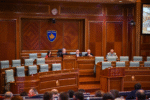Prime Minister Albin Kurti has stated that, in addition to the crimes committed by Serbia, rape was another ‘tool’ used to leave lasting consequences on many families.
In a discussion organized by Medica Gjakova on critical reflections on research regarding war rapes in Kosovo, Kurti declared that we must not remain silent in the face of this crime. Therefore, he said, in our efforts to address the wounds of the past, the Transitional Justice Strategy has been adopted.
“The wars of the 1990s in the former Yugoslavia left permanent consequences on many families. This was also one of Serbia’s strategies. In silence and social exclusion, the survivors of these crimes became the driving force for the recognition and prosecution of this war crime. In Kosovo, it was used as a tool of war by Serbia, a tool that left widespread consequences for individuals, families, the entire population, and society. Therefore, we must work to halt the destructive effect of this crime. In our efforts to address the wounds of the past, we are taking steps forward together. For the first time, the Transitional Justice Strategy has been adopted. The implementation of this strategy requires commitment from all of us. Thanks to Medica Gjakova and Medica Mondiale for this valuable study on the consequences. We call for solidarity from families and society,” Kurti declared.
https://www.facebook.com/share/v/K5RafbrKgcZdVReK
Medica Gjakova Publishes Report on Long-Term Consequences of War Rape in Kosovo: “I Am Not to Blame for What Happened to Me”
Medica Gjakova has published a report on the long-term consequences of war rape in Kosovo, titled “I Am Not to Blame for What Happened to Me.”
Based on testimonies from 200 survivors of sexual violence, including 191 women and 9 men, the research focused on the psychological, physical, and social impacts on victims of sexual violence.
The research revealed that 86% of survivors suffer from post-traumatic stress, either simple or complex, 96% have high levels of anxiety, and over 70% reported that their lives were not worth living after the war.
Dea Fetiu, who presented some of the main findings of the study, noted that half of the study participants described their health condition as very poor.
According to her, the research addresses a critical research gap, 25 years after the war, with still limited data on survivors of sexual violence.
“Now, 25 years after the war, there is very little data available, which is why Medica Mondiale and Medica Gjakova conducted this study based on the testimonies of over 200 survivors, 191 women and 9 men. All of them were victims of sexual violence during the war, and all are clients of Medica Gjakova. This study focused on the physical, psychological, and social consequences. Survivors face various challenges. The research found that 73% of study participants qualify for a diagnosis of complex PTSD, with another 13% qualifying for a diagnosis of PTSD. 95.5% of participants meet the criteria for clinical depression. 59 participants (29.5%) reported having suicidal thoughts in the past week, and 101 (50.5%) reported self-harm thoughts since the war, with 142 (71%) feeling that life was no longer worth living. 96% of participants reported high levels of anxiety,” she emphasized.
She also noted that nearly half of the study participants reported perceiving their health as poor, with 94 respondents (47.5%), while only 13 participants (6.5%) considered their health to be good.
“More than three-quarters of participants reported suffering from headaches, fatigue, neck pain, and/or back pain,” she said.
Meanwhile, Mirlinda Sada, Executive Director of Medica Gjakova, highlighted that the research focuses not only on long-term consequences but also on coping strategies, their experiences, and relationships with their immediate environments, as well as social acceptance and the importance of the support provided by Medica Gjakova.
Sada stated that survivors are not only living with the trauma of what happened to them during the war but also with stigmatization. According to her, this report is crucial, not only for addressing trauma but also for the stigma surrounding the survivors.







